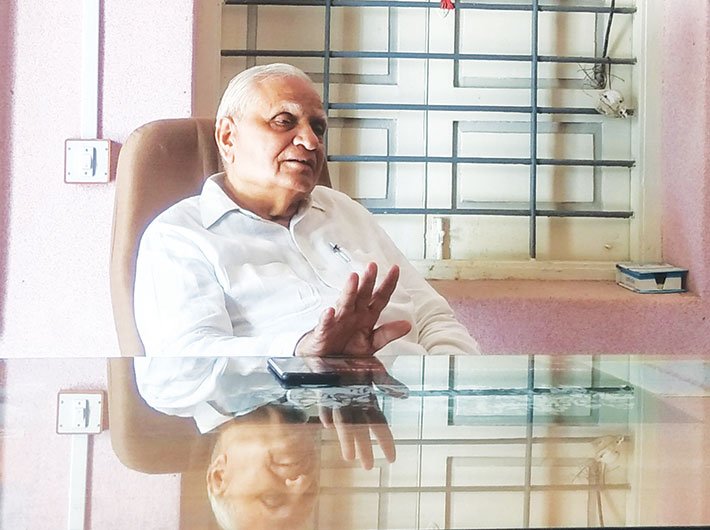Somabhai Modi, the PM’s elder brother, is happy running a physiotherapy centre and a home for the aged in Vadnagar. No active politics for him
Somabhai Modi says he remembers only one occasion when he offered his younger brother prime minister Narendra Modi advice regarding work. This, he says, was when Modi was chief minister of Gujarat. After one of his weekly grievance redressal sessions, the then chief minister had enquired after the well-being of a complainant he recognised from his early days. When Somabhai learnt of this incident, he wrote to the chief minister that such public displays of familiarity were inappropriate to the office he held.
“I felt it was not okay,” says the 74-year-old Somabhai, who runs an old-age home and a physiotherapy centre in Vadnagar, the Modis’ hometown. “I wrote that it was not ideal to highlight acquaintance during such a public meeting. You were sitting there in the capacity of a judge. People can object to it, and they can also misinterpret your judgement – it doesn’t matter that you might have made an unbiased decision. I wrote about a film I’d watched long ago, Sohrab Modi’s Nausherwan-e-Adil, in which Nausherwan punishes his son for a crime despite his wife’s wailing.”
Although Somabhai is a member of the Bharatiya Janata Party (BJP) since 1994, he has given active politics a wide berth. His white cotton shirt, beige trousers and black open-toed sandals do not exactly reflect a quintessential political leader’s personality. There are no security personnel around. However, his clout is evident from the way local leaders surround and follow him as he visits their villages. But in his office inside the Visamo old-age home, he is all by himself in a chair behind a table. A picture of the PM practising yoga hangs on the wall just beside him, the other side of the wall has pictures of his forebears, with their names written in Gujarati below. The visual resemblance between him and PM Modi strikes you only when he rests his chin on his supple fingers with the support of the table, as he patiently waits for a question-and-answer session with the visiting journalists.
Somabhai doesn’t refuse to be in selfies with reporters, but doesn’t easily smile at the camera either. As the interview commences, most of the questions asked are about his younger brother – whom he now calls ‘Narendrabhai’ – and his childhood. Where did he sell tea? Was it a part-time job? Did he really catch a baby crocodile when he was a kid? Was he a naughty kid? Did you too sell tea with him?
Later during a tête-à-tête in a cab, he says he himself did not sell tea. “My childhood was mostly spent studying. Reading was one habit that I shared with Narendrabhai. I landed a government job quite early in my life. I was only 18 when I joined the public health department of the Ahmedabad Municipal Corporation,” he says.
Somabhai doesn’t have many anecdotes from his own childhood, but has a few details about PM Modi’s childhood to share. He says, “We could see leadership qualities in him from the very beginning. When there was a spat between the kids in our village, he was the one they would go to, to get it resolved. He was funny too. My father used to call him Kumar affectionately.”
Somabhai’s father hadn’t finished school, and his mother was illiterate, but Somabhai wanted to study, and stand on his own feet. His youngest brother Pankaj Modi remembers Somabhai aka ‘Motabhai’ as the most responsible of his six siblings. “We came from a poor family. Being the eldest, he had more responsibilities on his shoulders. He was the first person in our family to get a government job. We were so proud of him,” he recollects.
As Somabhai watched Narendra Modi enter and ascend in Gujarat politics, he says, there were times when he was concerned about his brother’s life choices. Somabhai perceived and perhaps continues to perceive active politics as ‘jhanjhat’ (mess). “I was a bit worried, of course. No one from our family was in politics. I was afraid that his life will be unstable,” he says, but doesn’t remember having communicated his concerns explicitly to his brother or having tried to stop him. As time passed, he says, he realised that his brother was on the right track.
Somabhai joined the BJP a year after he left his 30-year service in the municipal corporation. Did he agree with the party’s political and ideological inclination at the time he joined, I ask him. “Ideology to party tay karti hai. Mai toh bas apana kaam karata hoon (It’s the party that decides its ideology. I just do my job).” His job has been to go to different constituencies before elections, listen to people’s complaints and report them to his brother. “It has been a fairly mechanical job. I do not give my opinion on anything. I simply report. However, when I visited Uttar Pradesh in February this year, I was appalled when I saw the semi-constructed bridges that could fall down someday easily. Then I saw a school where cheating during exams was officially allowed. I personally asked Narendrabhai to look into it.”
When not helping his brother, Somabhai divides his time between the old-age home in Vadnagar and his home in Ahmedabad – where he had been living with his wife Chandrika and two sons. He spends time reading his favourite authors – Kanhaiyalal Munshi, Ramanlal Desai, Pannalal Patel and Munshi Premchand. He prefers keeping a low profile.
Gulam Mohammad Patel, a local politician from Molipur – a Muslim-dominated village near Vadnagar, who has known Somabhai for over 15 years, says, “He’s calm and grounded. His life has remained just the same even after his brother became the PM. We requested him several times to join active politics, but he refuses. His sons, too, have picked up his humility and the entire family likes to stay away from the limelight.” Somabhai’s two sons have studied mechanical engineering, and according to him, they have no interest in politics.
Younger brother Pankaj Modi says, “Motabhai is into a lot of social work, but doesn’t like to talk about it. Woh propaganda karna nahi janate (He doesn’t know how to spread propaganda). He remains reserved. After our father passed away in 1988, he has been the father-figure to the family, but he doesn’t expect much from us. He’s there for us when we need him, but he doesn’t meet us that often,” he feels. Apparently, Somabhai has not even been to the PM’s residence in Delhi in the last three years. He jests, “If he [PM Modi] spends half an hour with me, the country will lose that much amount of his time.”
The reason Somabhai’s urge to serve hasn’t translated into a political career is that he loves his autonomy. “I have always had this clarity that I don’t want to get into politics. Mai swatantrata se kaam karate rahana chahata hoon (I want to keep working independently).” Asked whether he was targeted during the Gujarat riots backlash, he says, “Fortunately, I keep to myself for the most part and people who knew me, knew about my work and how I function. We did not become the target of the flak that we could have been targeted with.”
Somabhai does not have, or perhaps would not share his opinion on demonetisation, GST or any of the major decisions of the government. It seems like he’s fully aware of the possible consequences of even a single misspoken word. He claims that he doesn’t discuss politics with the PM in their occasional telephonic conversations. During the question-and-answer session with the media, he weighs his words and would rush to correct if someone distorts his statement.
Is caution a cost he has to pay for his brother’s ascendance? He says, “Yes, Narendrabhai’s enemies will see us too as their enemies and there’s some risk. But I have faith in paramatma (the supreme being). I have been allotted security too, but I leave them (security guards) back at home. I don’t want to carry this caution as a burden on my shoulders.”
pranita@governancenow.com
(The article appears in October 31, 2017 edition)

